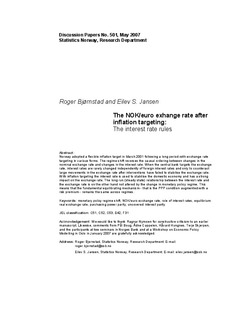The NOK/euro exhange rate after inflation targeting: : the interest rate rules
Working paper

Åpne
Permanent lenke
http://hdl.handle.net/11250/180619Utgivelsesdato
2007Metadata
Vis full innførselSamlinger
- Discussion Papers [1003]
Sammendrag
Abstract:
Norway adopted a flexible inflation target in March 2001 following a long period with exchange rate targeting in various forms. The regime shift reverses the causal ordering between changes in the nominal exchange rate and changes in the interest rate. When the central bank targets the exchange rate, interest rates are rarely changed independently of foreign interest rates and only to counteract large movements in the exchange rate after interventions have failed to stabilise the exchange rate. With inflation targeting the interest rate is used to stabilise the domestic economy and has a strong impact on the exchange rate. The long run (steady state) relationship between the interest rate and the exchange rate is on the other hand not altered by the change in monetary policy regime. This means that the fundamental equilibrating mechanism - that is the PPP condition augmented with a risk premium - remains the same across regimes.
Keywords: monetary policy regime shift, NOK/euro exchange rate, role of interest rates, equilibrium real exchange rate, purchasing power parity, uncovered interest parity.
Utgiver
Statistics Norway, Research DepartmentSerie
Discussion Papers;No. 501Beslektede innførsler
Viser innførsler beslektet ved tittel, forfatter og emneord.
-
The impacts of alternative policy instruments on environmental performance. A firm level study of temporary and persistent effects
Bye, Brita; Klemetsen, Marit Elisabeth (Discussion papers;788, Working paper, 2014-10)We study the effects of various environmental regulations on environmental performance measured as emission intensity. Moreover, we aim to test whether any such effects are persistent or only temporary. Conventional theory ... -
The welfare effects of carbon policies: grandfathered quotas versus differentiated taxes
Bye, Brita; Nyborg, Karine (Discussion Papers;No. 261, Working paper, 1999)Recently, it has been demonstrated that pre-existing distortionary taxes can substantially increase the costs of market-based instruments which do not raise revenue, such as non-auctioned emissions quotas. Revenue-raising ... -
Labour market rigidities and environmental tax reforms : welfare effects of different regimes
Bye, Brita (Discussion Papers;No. 242, Working paper, 1998)The working of the labour market is important for the total welfare effects of tax reforms. This paper analyses, by using a computable general equilibrium model for the Norwegian economy, how different assumptions about ...